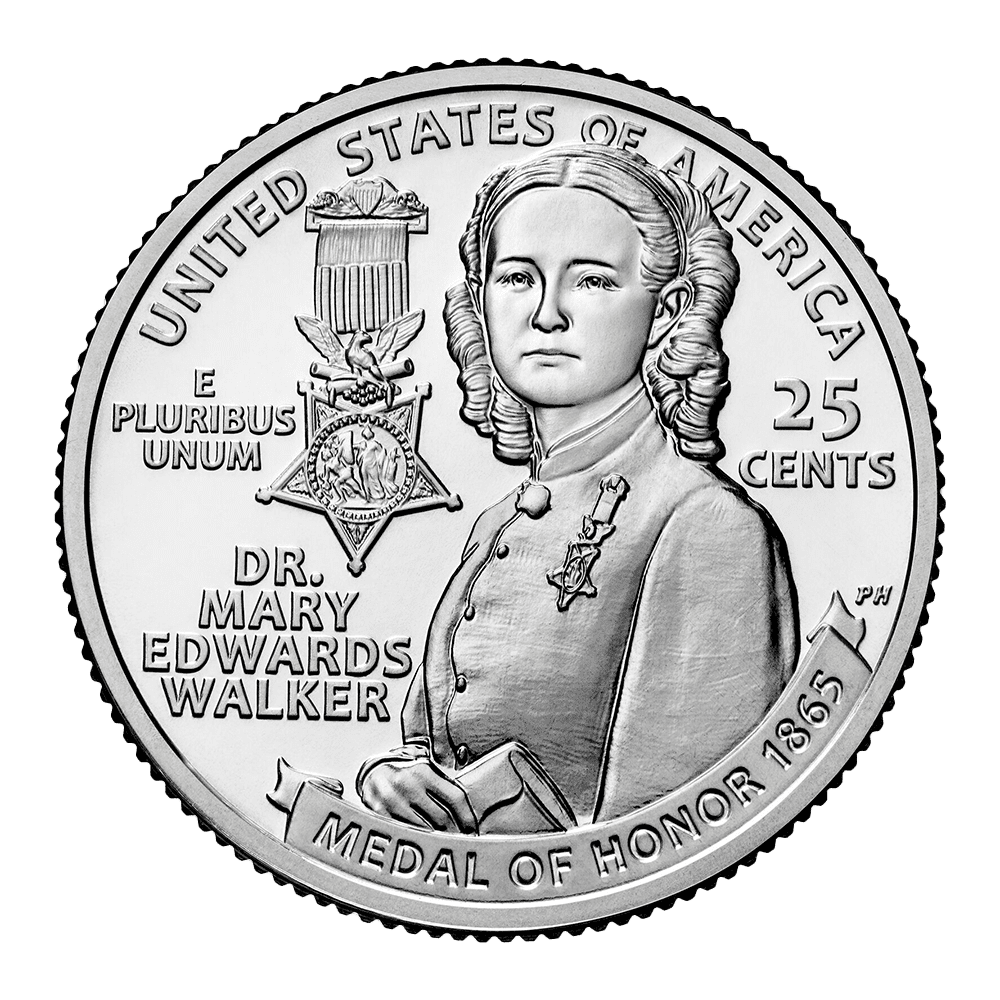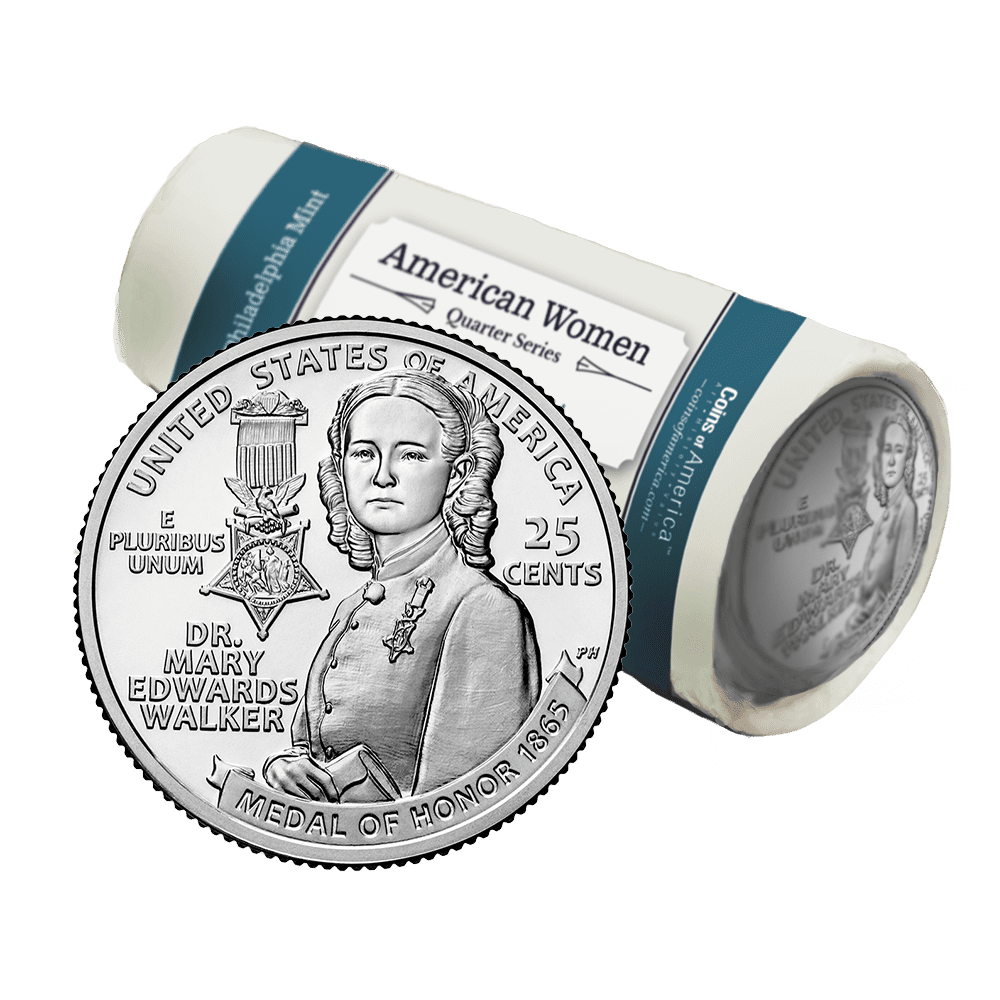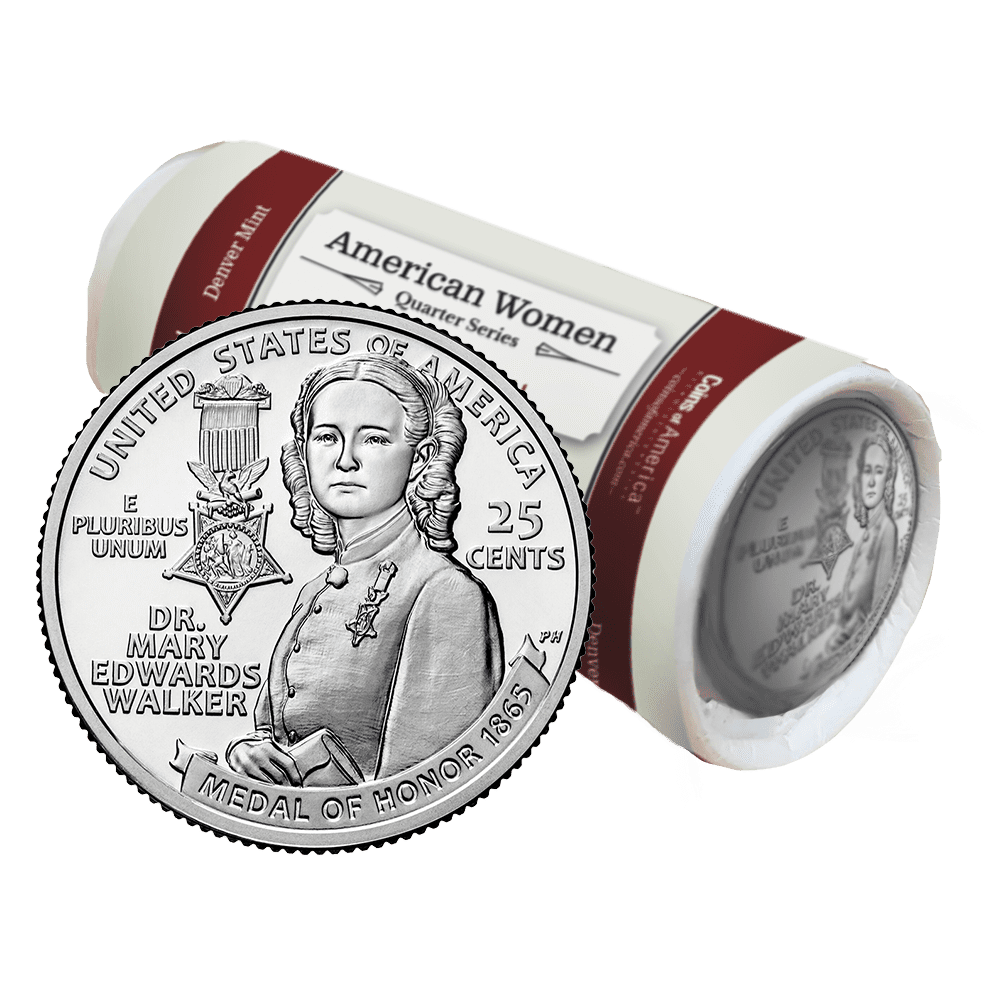Dr. Mary Edwards Walker
Price range: $1.99 through $24.95
The obverse (heads) depicts a portrait of George Washington, originally composed and sculpted by Laura Gardin Fraser to mark George Washington’s 200th birthday. A recommended design for the 1932 quarter, then-Treasury Secretary Mellon ultimately selected the familiar John Flanagan design.
The reverse (tails) depicts Dr. Mary Edwards Walker holding her pocket surgical kit, with the Medal of Honor on her uniform, and surgeon’s pin at her collar. After receiving the award, she continued to wear the Medal of Honor for the rest of her life. The left side of the design showcases the details of the Medal of Honor.
Please select the Mint and the Packaging from the options below.
Product Description
2024 Dr. Mary Edwards Walker Quarter – Honoring a Trailblazing Surgeon and Women’s Rights Advocate
The 2024 Dr. Mary Edwards Walker Quarter is the 13th release in the American Women Quarters™ Program, a U.S. Mint initiative that celebrates the achievements and legacies of influential women in American history. This coin honors Dr. Mary Edwards Walker, a pioneering Civil War-era surgeon, women’s rights activist, and dress reform advocate, who remains the only woman ever awarded the Medal of Honor.
Born in Oswego, New York, in 1832, Mary Edwards Walker was raised in a progressive household that encouraged independent thinking and challenged societal norms. Her parents supported her education and allowed her to wear “bloomer” pants—a radical departure from the restrictive corsets and skirts worn by women at the time. This early exposure to gender equality and practicality in dress would shape her lifelong advocacy for women’s rights and dress reform.
Walker graduated from Syracuse Medical College in 1855, becoming one of the few female physicians in the country. She married fellow medical student Albert Miller, and together they opened a medical practice in Rome, New York. Unfortunately, the practice struggled, likely due to public resistance to accepting a woman as a doctor. The couple eventually divorced, and Walker continued her medical career independently.
When the Civil War broke out in 1861, Walker volunteered her services to the Union Army. Despite her qualifications, she was denied a commission as a medical officer because she was a woman. Undeterred, she served as an unpaid volunteer surgeon at the U.S. Patent Office Hospital in Washington, D.C., and later traveled to Virginia to treat wounded soldiers near the front lines.
In 1863, the Army finally recognized her contributions and appointed her as a Contract Acting Assistant Surgeon (civilian)—making her the first woman to serve as a U.S. Army surgeon. Walker’s courage and dedication were evident as she frequently crossed battle lines to care for both Union and Confederate soldiers. In 1864, she was captured by Confederate forces and held as a prisoner of war for four months at Castle Thunder in Richmond, Virginia. After her release in a prisoner exchange, she continued her service at the Louisville Women’s Prison Hospital and an orphan asylum in Clarksville, Tennessee.
In 1865, President Andrew Johnson awarded Walker the Medal of Honor for Meritorious Service, based on recommendations from Major Generals William Tecumseh Sherman and George Henry Thomas. However, in 1916, the medal was revoked—along with several others—due to a change in eligibility criteria that excluded civilians. Walker defiantly continued to wear the medal every day until her death, asserting her right to recognition.
Walker was also a fierce advocate for women’s dress reform, challenging the restrictive clothing norms of her time. She believed that traditional women’s attire was impractical and unsanitary, and she often wore trousers, jackets, and short dresses. Her unconventional style drew ridicule and even legal trouble, but she remained unapologetic, using her clothing choices to make a broader statement about gender equality and personal freedom.
Dr. Mary Edwards Walker passed away on February 21, 1919. Decades later, her legacy was formally restored when President Jimmy Carter reinstated her Medal of Honor on June 10, 1977, thanks to the efforts of her grandniece and supportive members of Congress.
Design Details of the 2024 Dr. Mary Edwards Walker Quarter
The obverse (heads) of the coin features a classic portrait of George Washington, originally designed by Laura Gardin Fraser in 1932 to commemorate Washington’s 200th birthday. Although Fraser’s design was initially passed over, it now serves as a tribute to women in numismatics and American history.
The reverse (tails) showcases Dr. Mary Edwards Walker holding her pocket surgical kit, with the Medal of Honor proudly displayed on her uniform and a surgeon’s pin at her collar. The left side of the design highlights the intricate details of the Medal of Honor, symbolizing her bravery and groundbreaking contributions to medicine and civil service.
Why the Dr. Mary Edwards Walker Quarter Matters
The 2024 Dr. Mary Edwards Walker Quarter is more than a collectible—it’s a powerful tribute to a woman who defied convention, broke barriers, and dedicated her life to service and advocacy. As part of the American Women Quarters™ Program, this coin honors a legacy of courage, innovation, and resilience.
Whether you’re a coin collector, a history enthusiast, or someone passionate about women’s rights, this quarter is a meaningful addition to any collection. It commemorates a true American hero whose story continues to inspire.
You must be logged in to post a review.








Reviews